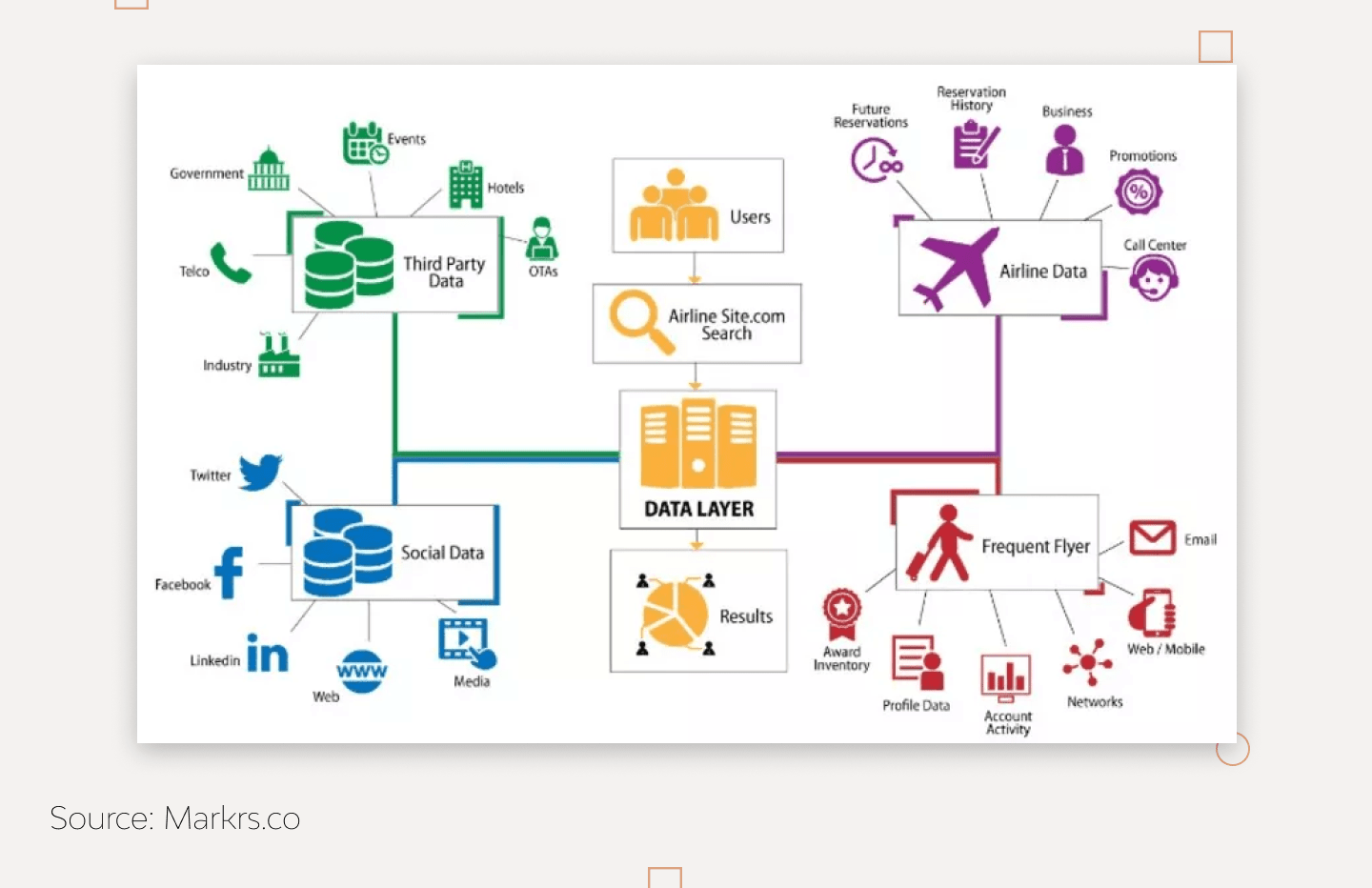How AI and Machine Learning Are Transforming the Travel Industry

AI and machine learning are no longer optional in travel and hospitality — they are critical drivers of efficiency, personalization, and competitive advantage. As global travel providers manage increasing data complexity and evolving guest expectations, the role of AI in travel and hospitality shifts from experimental to operationally essential. In this article, we examine the strategic applications of artificial intelligence in the travel and hospitality industry, from real-time pricing and demand forecasting to intelligent customer support and route optimization. We explore how businesses leverage machine learning in the travel industry to enhance decision-making, automate operations, and deliver seamless, context-aware experiences. With deep use cases and practical insights, we uncover how AI/ML in travel is transforming the full value chain — not just improving service delivery but redefining how travel businesses grow, compete, and innovate in a data-driven landscap.
Understanding AI and ML in Travel
Whether improving customer segmentation, personalizing offers, or optimizing revenue management, AI and machine learning in the travel industry and hospitality industry are powering business value across the sector. While often used interchangeably, the technologies serve distinct roles.
AI in travel and hospitality refers to the broader field of technologies that enable systems to mimic human decision-making—from virtual agents to predictive analytics. Machine learning in the travel industry focuses on training models to make data-driven predictions and adapt over time without being explicitly programmed. The effectiveness of any ML model depends on three critical components:
Data quality: Rich, diverse data helps uncover behavioral patterns. In travel, sources include browsing history, booking behavior, loyalty data, and even location signals. Access to high-quality datasets is a competitive advantage.

Feature engineering: These are the meaningful variables extracted from raw data — like location, browser type, or trip frequency — which influence model accuracy. Filtering out noise is key to reducing complexity and improving performance.

Algorithms: Choosing the right algorithm is essential. Each serves different goals — from classification and regression to clustering and recommendation — and performance can vary greatly depending on the dataset and task.
 Businesses apply AI/ML in travel to drive smarter pricing, reduce friction in booking flows, and deliver personalized digital experiences. The role of AI in travel and hospitality is shifting from experimentation to essential infrastructure — enabling companies not just to automate, but to anticipate guest needs at scale.
Businesses apply AI/ML in travel to drive smarter pricing, reduce friction in booking flows, and deliver personalized digital experiences. The role of AI in travel and hospitality is shifting from experimentation to essential infrastructure — enabling companies not just to automate, but to anticipate guest needs at scale.
Benefits of Using AI and ML in Travel
The growing adoption of AI/ML in travel is about redefining how businesses make decisions, engage customers, and manage operations. Below are six high-impact benefits that showcase the real value of the technologies.
Personalized Experiences – with AI/ML in travel, platforms can go far beyond basic filters and past bookings. Real-time behavior tracking, contextual signals, and predictive modeling allow companies to tailor offers based on micro-preferences, travel intent, and budget sensitivity.
Faster Bookings – AI streamlines the booking funnel by auto-filling data, pre-selecting relevant options, and optimizing flows based on conversion data. Combined with machine learning for hotels, systems can learn which layouts and offers convert better for specific customer segments.
24/7 Customer Support – AI-driven chatbots in travel now go beyond answering FAQs. They integrate with backend systems to handle cancellations, rescheduling, or loyalty points—reducing operational load while enhancing guest satisfaction through conversational support.
Dynamic Pricing – through deep learning models, providers can analyze supply, demand, competitor pricing, and booking windows. This enables agile rate adjustment strategies—an area where AI in travel and hospitality impacts profitability, operating in volatile markets.
Enhanced Security – AI/ML in travel also powers anomaly detection and behavioral authentication. From identifying fraud in payment flows to detecting bot traffic and unusual booking patterns, ML helps protect both users and platforms without compromising user experience.
Operational Efficiency for Travel Providers – AI systems can optimize everything from route planning and staff scheduling to inventory distribution and predictive maintenance. Data from IoT devices, CRMs, and guest behavior models allows travel providers to reduce waste and improve uptime.
AI and ML Use Cases in the Travel Industry
As the demand for hyper-personalization and real-time responsiveness grows, the role of AI/ML in travel becomes central to how companies operate, compete, and innovate. Below are key, practical AI use cases in travel, showcasing how data-driven intelligence is transforming guest experience.
Personalized Travel Recommendation Systems
Recommendation engines powered by machine learning in the travel industry analyze past behavior, contextual signals, and third-party data to anticipate intent. The systems continuously learn and adapt to user preferences, offering curated packages, room types, or upgrades. For platforms and OTAs, this means higher conversion rates and longer engagement times.
Revenue Optimization Systems
Using machine learning analytics for travel, businesses can forecast demand, monitor competitor pricing, and identify opportunities. For hotels, this includes adjusting rates by room category, booking window, channel performance, and even cancellation probability. Airlines and OTAs use similar models to manage fare classes and loyalty incentives, resulting in margin improvements.
AI-Powered Chatbots and Virtual Assistants
Built on NLP and trained on domain-specific data, these bots provide 24/7 multilingual assistance, manage bookings or changes, and offer personalized upsell suggestions. When integrated with CRM and booking engines, they become powerful touchpoints that reduce support costs while improving guest satisfaction. This is one of the most mature examples of AI in travel and hospitality, effective for airlines, hotels, and tour operators managing high communication volumes.
Data Analytics and Customer Insights
Artificial intelligence analytics for travel unlocks customer understanding by analyzing data across devices, platforms, and sessions. This includes behavioral patterns, search paths, feedback, and interaction histories. Combined with predictive modeling, companies can identify churn risks, segment audiences by revenue potential, and trigger timely, personalized engagement.
Operational Efficiency and Automation
From staff scheduling and predictive maintenance to resource allocation and route optimization, AI streamlines backend processes. Hotels use automation to forecast housekeeping needs based on occupancy trends, while airlines apply ML to crew planning and delay prediction. For travel management companies, automation handles everything from invoicing to itinerary consolidation.
Sentiment Analysis
AI-driven sentiment analysis enables real-time monitoring of guest perceptions, flagging dissatisfaction before it escalates. More advanced models even identify root causes (e.g., delayed check-in, poor Wi-Fi) tied to operational data. This is especially useful for multi-property hotel chains or platforms aggregating thousands of customer inputs daily, enabling proactive service recovery and brand management.
By combining artificial intelligence analytics for travel with behaviorally driven models, companies unlock real-time insights that elevate every part of the guest journey. The growing set of AI/ML in travel applications reflects a broader shift toward smart, adaptive, and automated business models.
Challenges of Implementing AI & ML in Travel
While AI/ML in travel offers immense potential, its adoption comes with real-world complexities that require strategic and technical planning.
Data Privacy and Security Concerns
With AI systems processing large volumes of sensitive user data, ensuring compliance with GDPR, CCPA, and other data laws is critical. In the artificial intelligence travel industry, privacy breaches or misuse of behavioral data can erode customer trust and attract regulatory scrutiny.
Implementation Costs and Technological Infrastructure
Deploying effective AI/ML in travel demands significant investment in cloud infrastructure, engineering talent, and ongoing model maintenance. For many organizations in the machine learning travel industry, balancing cost, performance, and ROI can be a long-term challenge.
Third-Party App Access Restrictions
Access to platforms like Google, Facebook, or third-party booking systems is often limited or gated by evolving APIs and terms of service. These restrictions can hamper integration efforts and reduce the effectiveness of connected AI ecosystems in travel platforms.
Future Trends in AI/ML for Travel
The evolution of AI/ML in travel is shaping a new era of fully personalized experiences. Below are key trends that will define the industry’s digital future.
Integration with IoT
Connected devices — from smart hotel rooms to luggage trackers — will play a bigger role in enhancing real-time responsiveness. As IoT data is fed into AI/ML in travel, systems will dynamically adjust lighting, climate, service delivery, and even maintenance, creating seamless guest environments.
Hyper-Personalization at Scale
Future personalization will include behavioral signals, emotion recognition, and real-time location data. AI will adapt offers, pricing, and messaging per user, enabling hospitality businesses to act on individual intent, not broad segments.
Voice AI Integration
Voice assistants are expected to become primary interaction tools in hotels, airports, and apps. Travelers will book, check in, and request services via natural conversation. Integration with backend AI systems will ensure accurate fulfillment through voice.
Autonomous Travel
AI will power autonomous airport navigation, smart itineraries, and even driverless hotel transfers. Travelers will rely more on systems that predict, plan, and optimize every step—with AI/ML in travel acting as a real-time travel companion.
Conclusion
As the travel and hospitality industry evolves, data is no longer just an operational asset — it’s a strategic differentiator. The integration of AI/ML in travel is enabling businesses to move beyond reactive service and toward predictive, intelligent experiences at scale. From personalized journeys and automated support to dynamic pricing and operational optimization, AI and ML are transforming how travel companies compete, engage, and grow. However, success depends not just on adopting the latest tools but on aligning AI strategy with real business objectives, data integrity, and scalable infrastructure. For organizations willing to invest in the right foundation, the payoff is significant: smarter decision-making, leaner operations, and more satisfied travelers. The future of travel is not just digital — it’s intelligent, adaptive, and data-driven. And AI/ML will be at the center of that transformation.
If you are looking for an experienced development team to ensure your travel service is to the highest standard, contact Django Stars.
- How can AI and ML be used to personalize travel experiences for customers?
- AI and ML can analyze large datasets on customer behavior and preferences, including past travel itineraries, social media activity, and search history. This data can then be used to provide personalized recommendations for travel destinations, accommodations, activities, and more. For example, an AI-powered chatbot can assist travelers in finding the best flights and accommodations based on their budget and preferences. Also, travel providers can offer customers some predictions based on AI analytics.
- How can travel companies implement AI & ML without losing the human touch?
- Travel companies can use AI to augment customer service, not replace it: AI-powered chatbots and virtual assistants can help customers with basic queries and tasks, but there should always be an option for customers to speak with a human representative if needed.
- They can incorporate human oversight and review to ensure that AI and ML algorithms are making accurate and ethical decisions.
- Also, they can use natural language processing for customer service interactions, and incorporate feedback loops to continuously improve the AI & ML algorithms.
- Additionally, transparency in how data is collected, used, and protected can help build trust with customers and alleviate concerns about AI and ML being too impersonal.
- What are the potential future app ideas of AI/ML in the travel industry?
There are many potential future app ideas for AI/ML that have the potential to revolutionize the travel industry, for example:
- Personalized trip planning
- Real-time speech and text translation
- Predictive maintenance for planes, trains, and other modes of transportation
- Dynamic pricing based on supply and demand
- Augmented reality (AR) travel guides
- How can AI be used to improve the safety and security of travelers?
Travel companies can use AI to improve the safety and security of travelers in various ways. For example:
- AI can help assess the risk of a destination by analyzing a wide range of data such as crime rates, weather patterns, political stability, and health risks. This information can be used to advise travelers and guide their decisions.
- To detect fraudulent activities such as identity theft and credit card fraud, AI can analyze patterns and anomalies in data.
- AI can be used to detect potential threats such as suspicious behavior, objects, or movements in public areas. It can also monitor social media and other online sources for potential threats.
- AI can analyze real-time data and provide instant information to emergency services for emergency response. For example, AI can detect traffic jams or accidents and alert emergency services to send help.
- AI can help monitor travelers' health and detect potential health issues by analyzing data from wearable devices or other sensors.










Всего комментариев: 0